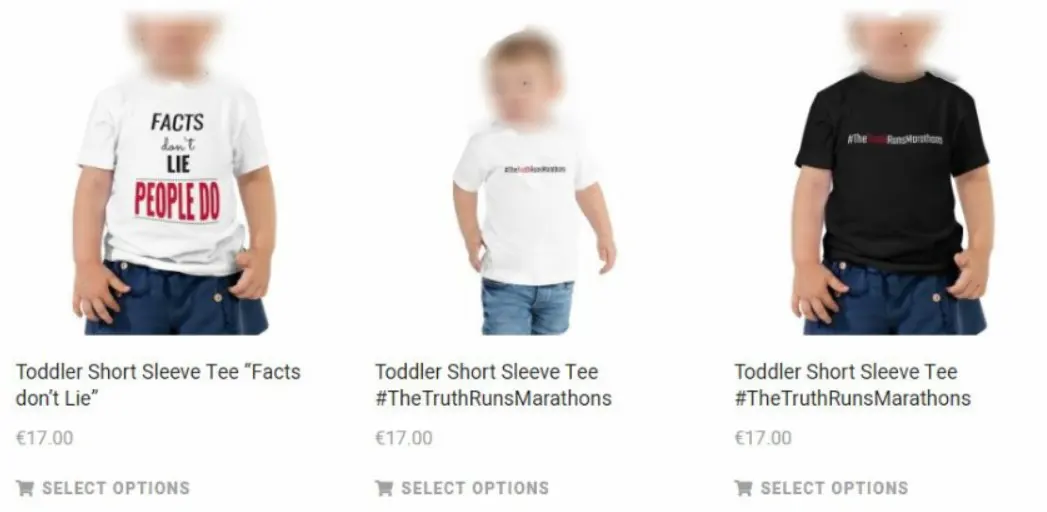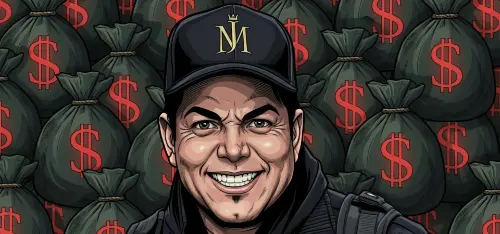Taj Jackson Funded by Victim-Blaming MJ Merchandise Sales

Apr 8, 2020
A few weeks ago, I stumbled across a link shared in a private Twitter thread. It led me to a website I hadn’t encountered before—The Michael Jackson Innocent Project. At first glance, it resembled a typical fan-run tribute to the late pop icon. But beneath the glossy visuals and reverent tone lay something far more troubling: a fully operational online shop selling merchandise emblazoned with slogans like “Facts Don’t Lie, People Do” and #TheTruthRunsMarathons.
This wasn’t a celebration of Jackson’s artistry. It was a coordinated effort to reframe the narrative around the long-standing allegations of child sexual abuse that have shadowed his legacy. The merchandise, and the messaging behind it, seeks not only to discredit survivors but to monetise denialism—turning controversy into cash and myth into merchandise.
The Slogan
The phrase “Facts Don’t Lie, People Do” first gained traction in 2019, shortly after the release of HBO’s Leaving Neverland, a documentary that featured detailed allegations from Wade Robson and James Safechuck. In a bold and short-lived PR campaign, the slogan appeared on London buses, only to be swiftly removed following public outcry. The Survivors Trust, a UK-based charity supporting victims of sexual abuse, condemned the campaign for its insensitivity and implicit victim-blaming.
The campaign was orchestrated by Anika Kotecha and Sean O’Kane, a former Big Brother contestant. Since then, the slogan has become a rallying cry for Jackson’s most fervent defenders, including his nephew Taj Jackson, who has used it extensively in interviews, tweets, and promotional materials for his upcoming documentary series, The Truth Runs Marathons.
Origins Of The Website
According to WHOIS records, The Michael Jackson Innocent Project was launched in March 2019 and is operated by a Dutch national known as “Souza,” alongside contributors from the UK and US. Souza claims the site’s mission is to uncover the “truth” behind what she describes as a conspiracy to destroy Jackson’s legacy. In practice, however, the site functions as a digital echo chamber—recycling long-debunked arguments, attacking accusers, and soliciting donations from fans desperate to believe in Jackson’s innocence.
The tone is not merely defensive—it’s combative. The site positions Jackson as a persecuted figure, a victim of media manipulation and false testimony, while casting doubt on the credibility of his accusers. It’s a familiar playbook: discredit the messenger, question the evidence, and reframe the narrative as a moral crusade.

But it’s the merchandise that truly raises eyebrows. The site offers a wide range of products—hoodies, mugs, tote bags, and even baby clothes—all bearing slogans that implicitly accuse abuse survivors of lying. Some items are modelled by children as young as three or four, a choice that feels not only tone-deaf but deeply inappropriate given the nature of the allegations against Jackson.
How Taj Jackson Benefits
The ethical concerns don’t end with the messaging. According to the site and its affiliated YouTube channel, 50% of all profits from merchandise sales—and half of the £9.99 monthly membership fee—are funnelled directly to Taj Jackson to support his documentary project. Taj launched a GoFundMe campaign in early 2019, which has since raised over $212,000. Yet, as I’ve previously documented, the campaign’s description contains several misleading claims that appear to violate GoFundMe’s own terms of service.
To test the legitimacy of the merchandise operation, I sent a deliberately sarcastic email to The Michael Jackson Innocent Project under a pseudonym. I expressed my enthusiasm for dressing my four-year-old daughter in a “Facts Don’t Lie, People Do” T-shirt and asked whether the profits truly went to Taj Jackson.
My email:
I came across your amazing website in support of Michael Jackson. One thing that caught my eye was the merchandise you now have for sale. As a parent myself, I would be extremely proud to see my four-year-old daughter display the "Facts Don't Lie, People Do" slogan, as well as myself and my wife.
I'm happy to buy several T-shirts and other various items, but I just wanted to make sure this is legitimate, and that 50% of all profits are going directly to Taj Jackson to help fund his upcoming documentary series, as stated on your website.
Thank you very much for your time, and keep up the good work.
Response:
Hi Michael,
Yes we are absolutely legitimate, if we state that we send 50% of profit to Taj, we really do. You can ask Taj about that. He has also been on our live stream 3 times and he has been wearing the merch himself!
Let me know if I can help you with anything.
Best wishes,
Souza
The email even included a photo of Taj Jackson wearing one of the hoodies, reportedly taken at a university event in the Netherlands, alongside filmmaker Danny Wu. A YouTube video was also linked, showing Taj once again sporting the same hoodie—priced at €37, for those curious.
On the same day, I reached out to Taj Jackson directly, asking whether he was aware of the merchandise and its messaging. I also reiterated my (fictional) intention to dress my young daughter in support of his cause. As of writing, I’ve received no response.
Conclusion
What began as a curious click on a link has unravelled a deeply unsettling reality: a fan-led initiative that leverages merchandise, messaging, and monetary influence to rewrite the narrative around one of pop culture’s most controversial figures. The Michael Jackson Innocent Project doesn’t merely celebrate Jackson’s music or defend his reputation — it actively undermines the experiences of abuse survivors through victim-blaming slogans and questionable fundraising practices.
The phrase “Facts Don’t Lie, People Do” might appear, at first glance, to champion truth. But its deployment here is not neutral. It functions as a pointed accusation — a way to cast doubt on those who speak out, suggesting their testimony is driven by lies or ulterior motives. In doing so, the campaign shifts the spotlight from meaningful dialogue and accountability to idol defence at any cost.
More troubling still is the decision to market this slogan to — and through — children. Clothing modelled by toddlers, emblazoned with such a loaded statement, not only trivialises the gravity of the allegations but also draws minors into a polarised debate they cannot comprehend. It’s a stark reminder that fandom, when unmoored from ethical considerations, can become its own form of exploitation.
Then there’s the financial trail. The site claims 50% of its merchandise profits and subscriber fees go directly to Taj Jackson — an individual who not only wears the merchandise publicly but has yet to clearly distance himself from the platform selling it. While Taj is entitled to challenge Leaving Neverland through his own documentary work, funding that campaign with proceeds from questionable merchandise undermines its credibility and raises serious ethical questions.


